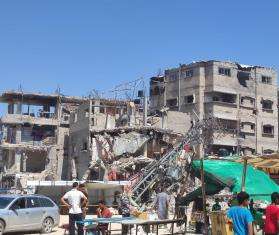FEBRUARY 27, 2017—Thousands of people trying to flee Eritrea are suffering from inhumane, violent, and deadly treatment as the European Union increasingly collaborates with the governments of Eritrea, Libya, Sudan, and Ethiopia to stop them from reaching European shores, according to a new report by the international medical humanitarian organization Doctors Without Borders/Médecins Sans Frontières (MSF).
The report, Dying to Reach Europe: Eritreans in search of safety, is based on the testimonies of more than 100 Eritrean refugees rescued by MSF from overcrowded boats in the central Mediterranean. Fleeing indefinite, forced conscription in Eritrea—a situation which many compare to slavery—many Eritreans have legitimate claims to asylum, which is borne out by those who are fortunate enough to reach Europe and have their claims heard.
"Ninety percent of Eritreans who manage to reach Europe over land and sea are granted asylum," said Arjan Hehenkamp, MSF general director. "European governments recognize their claims as genuine, but despite this are doing all they can to prevent them and others seeking asylum from reaching European shores."
At the same time, the EU's attempts to stem migration at multiple points along the journey leave people no choice but to pay smugglers in a dangerous and deadly journey through checkpoints and prisons and ultimately onto boats in the Mediterranean Sea.
The report reveals the severe violence that Eritreans suffer as they attempt to flee their country:
- Every Eritrean interviewed by MSF teams on its search and rescue vessels in the Mediterranean Sea reported being either a direct victim or a witness to violence, such as torture, at various locations throughout their journey.
- Every Eritrean interviewed reported being held in captivity of some kind, while more than half reported seeing fellow refugees, asylum seekers or migrants die, most often as the result of violence.
- Every Eritrean woman interviewed by MSF either directly experienced, or knows someone who has experienced, sexual violence.
MSF teams in Ethiopia, Libya and on search and rescue vessels in the Mediterranean Sea regularly treat Eritrean refugees for medical conditions consistent with these accounts, including heavy scarring, wounds, and severe psychological illnesses.
MSF calls on Libya, Sudan, and European states to stop forcibly returning Eritreans to Eritrea or to third countries from which they may be sent back to Eritrea. MSF also calls on the European Union and its member states to stop brokering migration agreements that do not offer adequate protection to Eritreans and other refugees and asylum seekers, and to stop making aid funds conditional on preventing migration.
"It is vital that the European Union, member states and other governments provide channels to safety and protection for Eritreans, and indeed all people fleeing conflict and persecution," Hehenkamp said. "Efforts to manage migration should not externalize border controls to unsafe countries—wherever they may be—or make aid funds conditional on preventing migration. People seeking protection must not be abandoned or left trapped in unsafe places, with no option but to risk their lives on a perilous journey."



